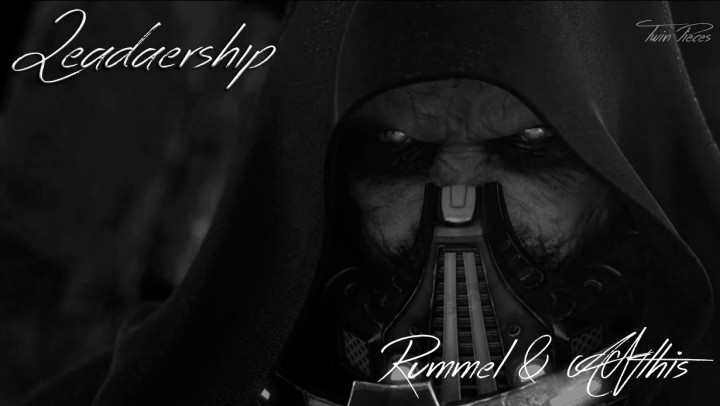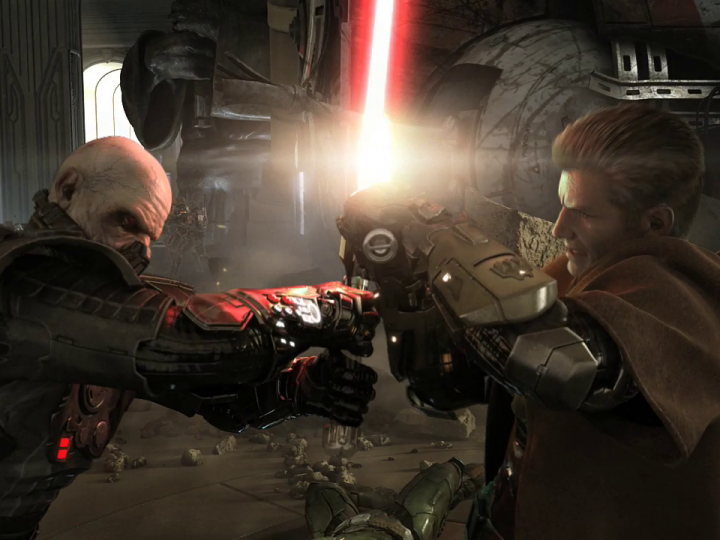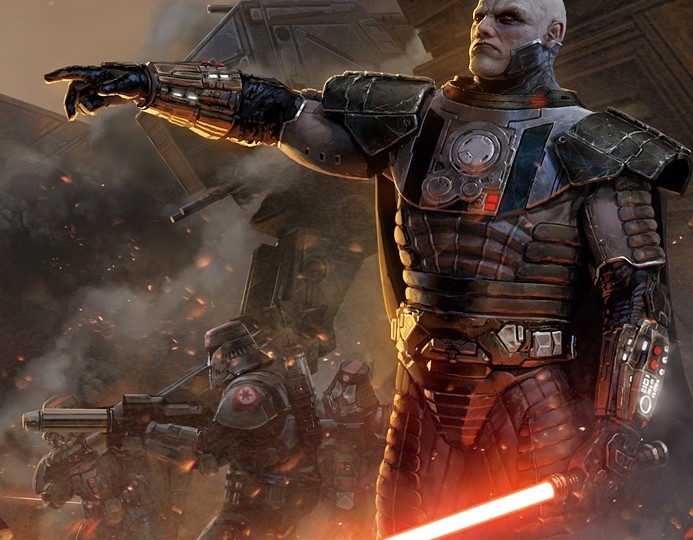After a Skype chat with Ravs about gaming and blogging we decided to write a twin piece about in-game leadership – specifically that required when leading a guild in SWTOR. She would focus on PvE guilds and me PvP. My very first thought was that I would love to get an interview with the GM of old Reality Check; a guild which gained it’s reputation on the server for putting up a fight against Nostrum Dolus. By going from occasionally queuing with unfavourable compositions Autumn 2012 to being a force to be reckoned with on TOFN by mid 2013 RC managed to establish themselves in the top tier bracket. With 60+ members, a lot of which were extremely strong minded, stubborn individuals, how does one manage the guild and keep it together?
Since the removal of 8v8 warzones the guild has unfortunately been mostly inactive. Being new to the game this interview would be especially interesting to me since I was not around at the time of ranked 8v8. Getting it however was not easy, I had to use all my powers of persuasion, but luckily for me I somehow tend to get what I want in the end. Rummel, GM of RC, finally agreed to conduct the interview with me under the condition that his friend, confidant and Co-GM Anthis could join – a condition I was happy to agree to.
Guild: Reality Check
GM: Rummel and Co-GM Anthis
Server: TRE/TOFN – Faction: Imperial
Game: Star Wars: The Old Republic
What in your opinion is the key to keeping a PvP guild alive and active?
“The worst thing for me when I’m in a PvP guild is to log on and no one is online, so it was always important for me to keep looking for active, competent players”, Rummel explains. “From day one my goal was to increase the number of members because in a PvP guild I really think that’s one of the most important things. To have someone to queue up with. It was about finding the balance between too few and too many players. In a competitive environment and with a big guild like RC the restrictions of an eight player team can be challenging cause people wanna participate. To keep those competitive players active and in the guild we tried to, especially in the start, rotate people in the team. We realised however that didn’t work and made several teams for ranked.”
What guild activities did you use to do and how often?
“We used to do ranked every night except Wednesday which was PvE night”, Anthis tells me.
Rummel then adds to this: “We also had some in guild tournaments with rewards, like 1v1 etc.”
What to you are important qualities for a guild leader?
“I’d say the most important abilities for any leader” says Anthis, “are approachability, the ability to see both sides of an argument and not letting personal feelings get in the way of leadership. The people you lead have to trust you and your judgement.”
“I’ll have to agree to that” says Rummel. “In the beginning I found a lot of inspiration in ‘The Warlords’ GM Miu in how he built the guild by very tirelessly working to get the members he wanted. Another source of inspiration, specifically when it came to how to run a guild, was our old ‘Victory’ GM, Steele. He was very much an introvert but always fair and his decisions were based on sound arguments. The most important and also most unappreciated quality in a GM I think is to be able to look at a conflict from both sides. It was something I really tried to incorporate but at times it was problematic to say the least. There will always be a lot of drama in a guild like RC and people didn’t like it when me and Anthis tried to see it from both sides. Cause even if the person was in the right I would listen to the other side of the story before passing a judgment which would annoy people. They’d just say ‘fuck you I’m right’ and expect me to take their side instantly. In one way I can understand where the frustration comes from. Snave told me the other day: ‘Having indecision from leaders always equals disarray. And trying to please everyone will always result in people being unhappy you haven’t catered to them more.’ It was definitely true for me and Anthis. Maybe Glory too, I’m not sure he was confrontational enough. Snave was the only one who’d do the dirty work. I don’t know, when Glory and Snave joined I took a more passive role, that is true I guess. More of the visionary making sure RC went in the direction it did. The rest of the officers were more hasty, like ‘kick him’ and ‘do this’ while I’d consider it or argue against it. Many times i put my foot down saying ‘that’s not how this guild is gonna be’, even against Anthis. I took a more abstract and administrative role maybe, but it was due to my sense of direction and vision for the guild that I recruited officers such as Glory and Snave. I mean, I always appreciated what they brought to the table but it seems they neglected to see that me and Anthis brought anything at all. In hindsight maybe I should have been more decisive. But at the same time as a GM you need to be fair, just and hear everyone’s opinion or you’ll be bias in your decision making. It’s again about finding that balance I guess.”
How dependent was the guild on you?
“Well whenever I wasn’t around Anthis would be there to take over GM”, Rummel answers. “There wasn’t really a time where neither of us weren’t around so it’s hard to say if the guild were depending on us. The only time none of us were around was when 8v8 was taken out. We both quit, me first then a bit later Anthis. The guild died quite fast after that but saying it was cause we weren’t there wouldn’t be fair. As a group of competitive players without any means to compete it’s natural that people quit. ”
How do you handle delegation?
“In the beginning of RC” Rummel tells me, “I was doing everything pretty much alone. I eventually learnt as the guild was growing bigger that I couldn’t continue that way. I really burnt myself out doing it. In the end I demoted a lot of officers as I realised that the founding members shouldn’t have authority just because they had been there since the start. To get some more support from the guild in the running of RC I needed to make sure effort was being be recognised. I made specific officer positions with specific job descriptions.”
Did you have a lot of officers helping you run the guild?
“We had one PvP, one PvE and one PR/Recruitment officer. We also had a team leader for each ranked team we had, some of which were eventually promoted to officers”, Rummel explains.
Who were the officers towards the end?
“I was really content with the officers we had towards the end. We had Kilnesh as PvE officer for a really long time, and eventually we gave the role to Pelara, which he loved”, Rummel says and laughs.
Is that sarcasm I detect?
“Yeah, I forced him to be PvE officer”, Rummel admits.
“No, no, I asked him after you quit”, Anthis objects. “We tried before but he really didn’t want to. Then after all the drama and everyone quit he eventually did it because I asked him.”
“That’s true”, Rummel agrees. “Both Kilnesh and Pelara did very well.”
“Then there was Glory as PvP officer”, he continues.
“We had tried out a few different people for this role but non had really worked out. Glory was perfect for it though”, Anthis adds.
Rummel agrees to this.
“Handling RC’s first ranked team was a massive undertaking in it self because it was filled with egos”, he says. “Glory was very charismatic and a skilled player. It meant that he was well respected within the community and he ended up being a very good leader for the team. Most of our first teams’ success is thanks to him. ”
And the PR/Recruitment officer?
“Well that was Snave obviously”, Rummel answers.
“He did a good job as a recruitment officer, cause of his charisma and thoroughness”, Anthis tells me.
“Yeah” Rummel agrees. “Before he joined RC he was sort of infamous on the server but we recruited him because ideally we wanted to judge people for ourselves and not on their reputation. He did end up causing a lot of the drama in the guild. But in the end I am glad we recruited him because he was the one of the officers that was most active in wanting to help out. He didn’t need to be pushed but took initiative himself. He was very active on the forums, until he was banned, always trying to create events together with Glory. They were both working hard on getting the community together through events and kickballs. When the news about the server transfer came, Snave wanted to make a lot of noise and put RC on the map. He encouraged streaming more within the guild and started a podcast himself. He was just a very active contributor to the guild in so many ways, always drawing attention to us through different mediums. He was also a master at shit-talking which was very much a good thing in my opinion. He encouraged a lot of competition between the factions and guilds that way.”
What do you find hardest in being GM?
After thinking for a minute Rummel tells me: “One of the things that was really tiresome was that on a regular basis I would end up just standing on the fleet talking to people and mediating conflicts. Our officers Snave and Glory did a lot of work for the guild, but I think much of the work that me and Anthis did was behind the curtains and not as easily seen from the outside. That was something that we got a lot of negative attention for, that we were ‘lazy’ in the way we were running the guild, when in reality it took up so much of my time and energy. I think one of the things people overlook is that it’s the GM’s job to handle the officers. Considering Snave was an officer, that in it self should be enough to set the ‘lazy’ argument to rest. Snave is a handful, he know’s it himself”, Rummel says laughing fondly. “In the end being GM for RC, was often a very tiresome, unappreciated job. So many times I’d literally just be standing around on the fleet for five hours or so talking to people and it pissed me off at the time because I just wanted to log to do my daily.”
“Yeah, guild like RC there was never an end to the conflicts needing to be settled”, says Anthis. “I think the hardest choices are the ones which have to be made for the good of the guild, but are opposed by your friends. Usually those kind of decisions tear guilds apart. The biggest thing I’ve learnt from running RC is the importance of communication and teamwork since most of the drama we have to deal with in life is because people don’t talk to each other and because we are assuming things that are much worse than the reality.”
“Definitely”, Rummel agrees. “I think for me as well, and probably you too Anthis, being GM was a situation where I was thrown into a role that I had no experience of. I had never dealt with leadership before, not in-game or in real life. In the beginning there was a lot of trying and failing done in order for me to understand how to handle being GM. I needed to figure out my own strengths and weaknesses. In the end when I had that better worked out, I got myself some hands-on officers like Glory and Snave because I knew that wasn’t my strongest side.”
So what is your advice when dealing with guild drama? How do you avoid it?
“You avoid it by making yourself available to your guild members so that they will come to you with their problems before they decide to backstab you instead. Be approachable and communicate. Make sure that people aren’t afraid to come to you when something is wrong. Also important is to not invite people who create drama. Be confrontational and deal with stuff when it’s still small, that’s something I’ve learnt. Otherwise everything will blow up”, Anthis says.
__________________________________
My reflections
Research done into the subject of leadership in general tells us that some of the most important traits are considered empathy, consistency, honesty, a strong sense of direction, communication, creativity and last but not least conviction. The more respect we have from the people we lead the easier it will be to do so. The reason that good leaders are so hard to come by is probably because a lot of the qualities needed are often not found in one individual. People who have empathy, understanding, emotional intelligence and creativity are often not the people with a lot of conviction and authority. The assertive leader is often the one who is consistent and is very practical in their approach to leadership. We are easily convinced that this individual is capable but we will question their ability to hear us out and value our opinions.
It all comes down to trust I think. Decades of research show that we are all highly sensitive to the warmth and competence of those around us, but especially in those who lead us. “Warmth” is considered being friendly, understanding, loyal, and empathetic. It is seen as proof that you have good intentions toward others. Your competence is considered being skilled, effective, resourceful and assertive. It is seen as proof that you can act and follow up on your intentions. The only “warm” leader is not trustworthy because we doubt their ability to follow through on their good intentions and the only “competent” leader we don’t trust because we are not sure they will have our best interest in mind or take our opinions into account. A balance between the two must be found. It is proven that when our team trusts us as a leader, it increases commitment to team goals, communication improves, and ideas flow more freely which will improve our results. Maybe most importantly, when a group trust their leader they will be more willing to embrace new ideas and methods. On the other hand when a team doesn’t trust us as a leader, we don’t get their best effort or results. We will find that we are not able to inspire, influence or create any real change. We’ve become an ineffective leader.
The importance of how you handle delegation cannot be stressed enough in running a guild. As stated above, the likelihood of finding all of the abilities needed in only one person are not great. So instead of trusting the one person we can trust a team of leaders to take us in the right direction instead. If one person has the job to get us into shape and help us make progress then he might need to be very assertive and strict depending on the dynamic of the group he is leading. If this is the case then it is important that there is someone else in a leadership role that we feel comfortable approaching if we feel unhappy or unsatisfied with something. This can be a complex and difficult clockwork to maintain. If there is a healthy and functional communication between the people in charge this system should work in the favour of the guild and it’s members.
Leadership within a game like SWTOR can in some ways be even harder than in real life. We know that many leadership development programs utilise MMORPGs to improve the effective teamwork and leadership skills within workplaces. I very much doubt however that they would be tested by trying to create and sustain a guild in SWTOR. This is a heavy task indeed. Running an effective and successful PvP guild these days, especially without 8v8, is becoming increasingly difficult. With the lack of competitive PvP actively happening on the server the reasons to belong to any one guild are diminishing.
What are your thoughts on the subject? What makes a good guild leader? Also don’t forget to check out Ravalation’s leadership post, just follow this link!






